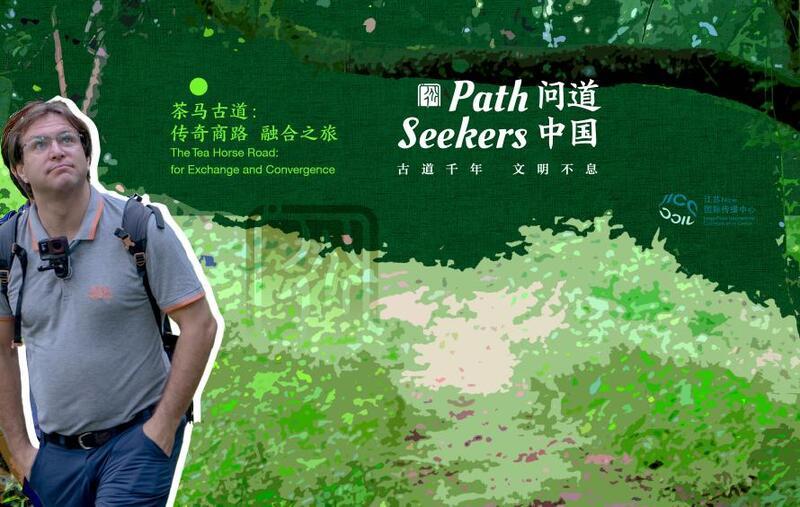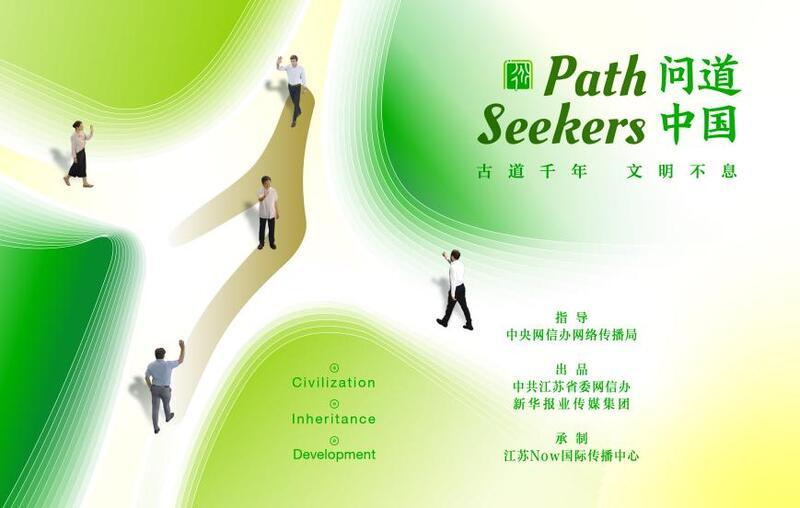Path Seekers 问道中国②|茶马古道:传奇商路 融合之旅
2024-12-04 16:31:48新华报业网
The Tea Horse Road winds through the towering mountains of southwest China.
Since the Tang Dynasty in the 7th century, people from China’s inland regions and its southwestern border areas exchanged tea, horses, and other goods, carving out a mysterious trade route through the mountains with countless caravans and porters.
The barter trade on the Tea Horse Road feels familiar to David Couvidat from France. In his homeland, mule caravans carried salt from Camargue along the "Salt Road" to Rouergue (now in Aveyron), exchanging it for timber used in shipbuilding.
Having lived in China for six years, David has been actively promoting French language and culture. Moments of discovery often leave him marveling at the fascinating connections across time and space between China and France.
More often, he finds himself captivated by the unique charm of Chinese culture as he embarks on journeys across the country. This time, accompanied by Gong Liang, honorary director of Nanjing Museum, his destination is Pu’er City in Yunnan Province, where there are well-preserved remnants of the Tea Horse Road.
The mystery of the Tea Horse Road has long fascinated David. To him, tea, the primary commodity traded along the route, embodies the distinct flavor of China. The fact that this ancient pathway leads to the Qinghai-Tibet Plateau—often called "the roof of the world"—adds an air of wonder.
The journey offered a rich tapestry of experiences, appealing to any foreign expat with its aromatic tea, diverse cultures, unique customs of various ethnic groups, and breathtaking landscapes.
Walking along the stone-paved path, it dawned on David that tea is more than just a beverage or a lifestyle. It represents a shared aspiration for a better life among different ethnic groups. Driven by this common goal, these ethnic groups have cooperated and supported each other for generations.
For thousands of years, it was their collective effort that gave rise to the Tea Horse Road and expanded it into a sprawling network of trade and cultural exchange routes. This enduring spirit of unity and collaboration, he realized, is the foundation that has sustained Chinese civilization for millennia.

茶马古道,蜿蜒在中国西南的崇山峻岭中。自唐代起,汉藏两地为了各自的生活和发展所需,以茶叶和马匹等物产进行交换,无数马帮和背夫在群山之中踏出一条神秘的商路。
以物换物的古老贸易方式,对法国人大卫·库维达(David Couvidat)来说并不陌生。在法国,也曾有骡队沿着“盐路”将产自地中海沿岸卡玛格地区的盐运往270多公里外的鲁埃格地区(现法国阿韦龙省),换取用于造船的木材。在中国生活六年,通过法语教学展开文化交流,大卫时常感受到东西方文明跨越时空的美妙碰撞。
大卫也一次次被中国博大精深的文化吸引,一次次踏上亲身探索感知之旅。这一次,他和南京博物院名誉院长龚良一起,来到云南普洱。茶马古道的神秘令大卫着迷。在他看来,茶马古道上的主要货物——茶,是属于中国的味道;这条路通向世界屋脊青藏高原,更是充满了不可思议。
走在隐于山间密林的石镶路上,大卫心中的神秘之地变得具象。拨开视线中的浓密绿意,呈现在眼前的是不同民族的多元色彩。原来茶马古道是如叶脉一般的交通网络。当年,拓荒者生死跋涉,贯通了群山中的传奇商路。千百年来支撑人们跨越阻隔想方设法交流往来的,不是什么“神秘的东方力量”,而是各个民族对美好生活的共同追求、交融汇聚中的和合共生。而这,也正是中华文明延绵不绝的奥秘。

总制片Chief Producers / 杨力群Yang Liqun 双传学Shuang Chuanxue
总策划Chief Planners / 顾雷鸣Gu Leiming 刘伟Liu Wei
总监制Line Producer / 傅晴Fu Qing
总统筹Chief Coordinator / 沈峥嵘Shen Zhengrong
统筹Coordinators / 包闻军Bao Wenjun 王乃毅Wang Naiyi
制作Creators / 刘浏Liu Liu 陈澄Chen Cheng 朱娜Zhu Na 钱盈盈Qian Yingying 陈雨薇Chen Yuwei 王瑞枫Wang Ruifeng
美编Art Editor / 张迪Zhang Di
为您推荐
求是网2025-01-06 12:26:24
求是网2025-01-06 12:25:21
北京网友说2025-01-06 10:04:32
新华网客户端2025-01-06 09:23:07
央视新闻2025-01-06 09:22:37
央视新闻2025-01-06 09:21:57
中国经济网2025-01-06 09:21:31
中工网2025-01-06 09:20:42
人民网2025-01-06 09:20:03
中国经济网2025-01-06 09:19:39
人民网2025-01-06 09:19:15
中国经济网2025-01-06 09:18:29
央视新闻2025-01-06 09:18:04
一起解锁“微度假”多种打开方式“City Eat”成为年轻力消费新趋势
央视网2025-01-06 09:17:39
央视新闻2025-01-06 09:17:06
央视网2025-01-06 09:16:43
央视新闻2025-01-06 09:16:08
焦点访谈丨援企稳岗、技能培训、权益保障 政策组合拳兜牢就业底线
央视新闻2025-01-06 09:15:36
电力高速路 瞬传清洁电(奋进强国路 阔步新征程·重大工程巡礼)
人民日报2025-01-06 09:14:59
央视新闻2025-01-06 09:14:34
央视网2025-01-06 09:13:53
新华网2025-01-06 09:13:20
央视新闻2025-01-06 09:12:50
央视新闻2025-01-06 09:04:50
中国青年报客户端2025-01-06 07:29:17
中国青年报客户端2025-01-06 07:27:36
央视频2025-01-05 20:45:34
人民网+2025-01-05 20:33:33
央视新闻2025-01-05 20:31:18
新华社2025-01-05 20:30:16
